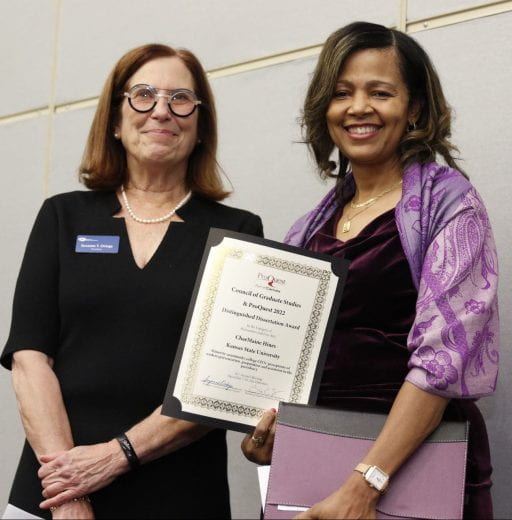
The statistics shared in the Data corner tells us that female students, students enrolled part-time, and students aged 25 and older form a great percentage of our student population.
Dr. CharMaine Hines, who earned a Doctor of Education in community college leadership from K-State in 2021, is an example of a professional returning to school after several years in the work place to advance her education and profession.
Hines earned three degrees from Eastern Michigan University and began working at private universities, major public research universities and colleges within the state of Michigan before embarking on her doctoral education at Kansas State.
Hines was not only successful in earning her doctorate, but her dissertation work was also recognized with a national award. She was selected as a recipient of the Council of Graduate Schools (CGS)/ProQuest Distinguished Dissertation Award, the first for a K-State student.
Hines currently serves as vice chancellor of academic accountability and policy at the Wayne County Community College District in Detroit.
We caught up with Dr. Hines to ask her about her K-State experience, attaining her PhD, and being published in a pair of peer-reviewed journals.
You earned three degrees at Eastern Michigan University and were already in the workforce. Why a doctorate and why K-State?
Hines: I earned my bachelor’s, master’s and specialist in education degrees prior to arriving at K-State. They afforded me significant opportunities to work within my passion for learning in higher education as a member of the faculty, working with undergraduate student researchers, academic deans and senior leadership. Completing my terminal degree was a personal goal, desire and dream fulfilled. Kansas State University’s Community College Leadership Program (CCLP) was the only choice, given its rich history as the oldest land-grant university in Kansas, a renowned community college leadership program with a rich culture of teaching, learning and distinguished faculty as community college leaders and practitioners. No other university-based doctoral leadership program boasts the same, so it was the wisest choice.
You spent 8-10 hours per day working on your doctorate. Describe how you managed your time. How were you able to stay focused on your career while also pursuing a degree?
Hines: Determination. Having appreciation for the 34 community college chancellors/presidents who afforded me their time for my research. The need to explore the silence in the literature on the Why and Causes.
I am a woman of faith and my family including children, siblings, extended family, church family and friends were each sources of resolute strength and encouragement to me.
Strength and support from my fellow KSU-Motown Cohort who we fellowshipped, practiced, bemoaned and we encouraged one another for each to get through the finish line. My Motown Cohort alone is significant in our diverse make-up, topics and completion, boasting an 83.3 percent cohort completion rate within two years of course completion. Of the 33 students completing their doctorate at KSU-CCLP, 27 percent are from my Motown Cohort. We are all making a difference in so many ways and I am so proud to be among them.
To complete a doctoral during a pandemic is indescribable. The distraction and noise from the world reflecting health, civil and social unrest were immensely difficult to block out. My family, support group and cohort members prayed me and each other through the losses and epic unknown times. The ability to invest a significant portion of time towards something more positive and meaningful while allowing me to connect with other persons with a common love for, appreciation of and passion for learning and helping others was a welcome respite to quiet the external distractions. It saved my peace, quite frankly, to focus on doing good and good work.
You have been published in two peer-reviewed journals in the last two years. Talk about the feeling you had when you found out the first time you were going to be published.
Hines: Ecstatic! Humbled and blessed. Grateful to the editors of the “Journal of Applied Research in Community Colleges” (JARCC) and “New Directions for Community Colleges” (NDCC) for their receptiveness to my research, and expressed ‘timeliness’ in highlighting particular aspects of the study found relevant and impacting conversations in higher education today. I’m grateful for their guidance of me as a practitioner-scholar where research is not my dominant practice and for embracing my work early on. The journey for being published in peer-reviewed journals is typically three years from proposal, interest not withstanding completion of the degree. I guess you can say I’m living my best life as I’m proud to be a K-State advanced degree graduate!
Read more about Dr. Hines’ research.